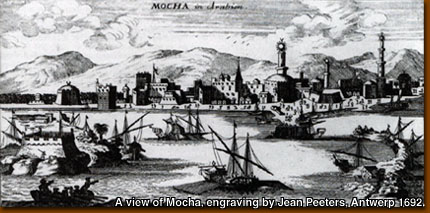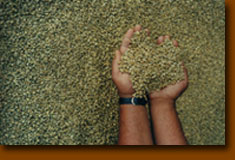
Al-Mocha, Al-Mokka - (Mocha).

"This
is archetypal coffee, for within a single cup of (Yemen) Mocha one may
glimpse all the flavours coffee growers around the world have to offer…"
Kevin Knox, Coffee Basics (1997)
Kevin Knox, Coffee Basics (1997)

Coffee trade substantially declined in later centuries, after Dutch, French and Portuguese sailors took the seed of the bean and succeeded in transplanting Coffee Arabica to their far-flung colonies.
"For
many generations Yemen Mocha coffee is recognized throughout the world
as the best coffee obtainable, a distinctive pungent winy flavor sharp
with acidity…"
William Ukers, All About Coffee (1935)
William Ukers, All About Coffee (1935)
Yemeni Mountains, reaching altitudes of more than 3,000 meters above sea and level. Until the present day the best coffee of Yemen is grown there on a rainfed terraces, carefully protected from much sun by the surrounding mountains. The ways of cultivating these terraces is still the same as it was some 300 - 400 years ago. Therefore it's worth noting that this coffee is grown organically in the "rich soil" of Yemen's mountains.
misunderstanding and misrepresentation. One might think this a case of
unscrupulous mislabeling; in fact, the growths of Haiti, Guadeloupe, and
Ethiopia were very much the same as those from Yemen. The coffee trees growing in the West Indies were at that time the grandchildren of the trees in Yemen; the beans produced in both locals were intended primarily as guides to flavor, the labeling was, if literally inaccurate, effectively true.
Were the growths of Arabia and Ethiopia compared today, the difference in flavors would be easily recognized. An attempt to classify these growths as Mochas in the modern marketplace would be deceptive and confusing.
How did what was true become a lie? The soil, altitude and climate of any given coffee-growing area contribute unique characteristic of body, flavor, and the beans produced in that area. It has been centuries since the Arabian seed was transplanted to the West Indies, and Caribbean coffee has taken on the character of its new home. For better or worse it must live up to the merits of its new name - not the name of its ancestors.
The term Mocha is defined in the International Coffee Glossary as follows:
Mocha: A small irregular bean of olive green color. It has a unique
acid character. Generally shipped from Mocha, Yemen.
Ahjeri, Anisi, Buraee, Haimi, Harrazi, Ismaeili, Mahweeti, Matari,
Wosabi, Raimi, Safani, Udayni and Yafi.
farm tastes different from coffee from another farm over the hill. These
may be fine coffees, but expert cuppers may have difficulty describing
the differences between them. Yemen does taste different, in dramatic
ways that will excite even a coffee novice.
Yemeni coffees has a soft blueberry back-taste or flavor.
We guarantee purity & genuinity of Yemen Mocha. We are able to provide our customers with the finest Mocha coffee Yemen has to offer.
Today and from this celebrated coffee origin, we feel proud to be able to provide this rare and delicious coffee to our customers the world over.
Copyright © 2001-2010
Yemen Coffee Processing Company. All rights reserved.
Powered by Rivotec
Powered by Rivotec